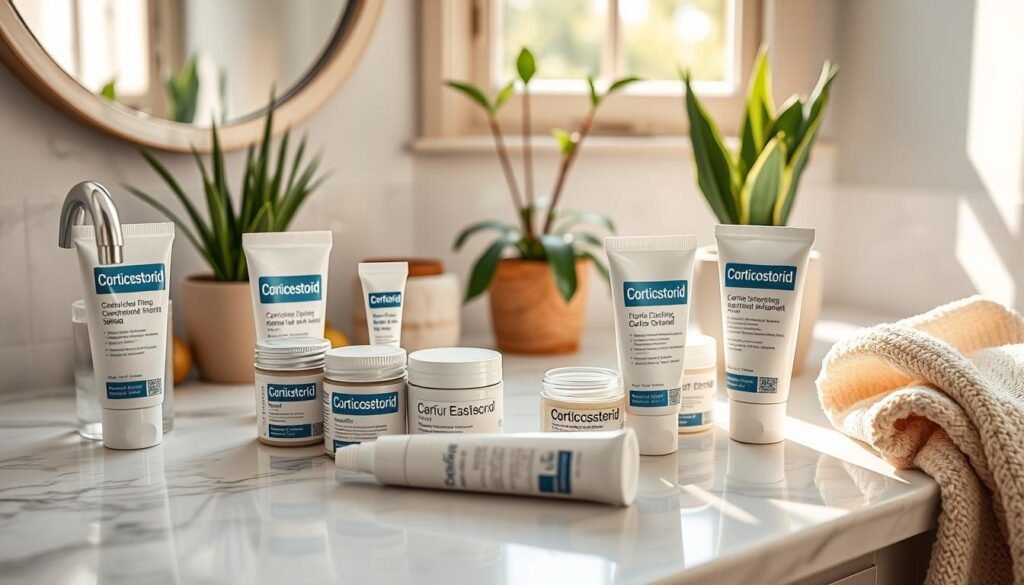More than 10% of Americans deal with eczema. This condition can cause a lot of discomfort. Thankfully, effective treatments can help. We will look at creams, ointments, and natural solutions for eczema. It’s important to know your options to manage eczema well.
Key Takeaways
- Understanding eczema symptoms is crucial for effective management.
- There are numerous topical treatments for eczema, including creams and ointments.
- Natural remedies can supplement traditional treatments for better relief.
- Regular moisturizing plays a critical role in controlling eczema flare-ups.
- Find the right treatments tailored to individual skin needs for optimal results.
Understanding Eczema and Its Symptoms
Eczema is a chronic skin condition that appears in many forms. It affects people in different ways. The eczema symptoms can be mildly annoying or very severe. Often, it causes dry, itchy, and inflamed skin, making life hard for those with the condition.
Common signs of eczema are redness, flaky skin, and sometimes blisters. Spotting these signs early is key to managing them well. By figuring out what triggers someone’s eczema, treatments can be customized. Check out this Eczema Overview to learn more about the condition.
Things like irritants in the environment, genes, and stress can make eczema worse. When these triggers act up, the symptoms get bad and need careful management.
Understanding how serious eczema is can change how we deal with it. With the right treatments and steps to prevent flare-ups, people can live better lives.
What Are Topical Treatments for Eczema
Topical treatments for eczema are key in handling this skin issue. They come in the form of creams, ointments, and lotions. Their main goals are to lessen itching and swelling and to keep the skin moist.
There’s a variety of products out there. It’s important to pick the right one for your unique skin needs. Doing so is crucial for the best eczema care.
These treatments help improve the skin’s protection, cutting down on outbreaks. It’s vital to know your skin type and eczema condition for personalized care. Always talk to a healthcare pro to pick the best treatment for you.
Types of Eczema Creams
Eczema creams help ease the discomfort of this skin issue. They come in different strengths, depending on your eczema’s severity.
Hydrocortisone Creams
Hydrocortisone cream is a popular choice for treating eczema. It’s a mild corticosteroid that reduces swelling and stops itching. It’s great for minor flare-ups and helps heal the skin. Remember to follow the directions to avoid side effects.
Prescription Strength Ointments
For tough eczema cases, doctors might suggest stronger treatments. These are usually topical corticosteroids. They’re much more powerful. These can really help people with chronic eczema live better.
Corticosteroid Ointments: Benefits and Risks
Corticosteroid ointments are key for managing Eczema. They help lessen itching, redness, and swelling effectively. It’s important to know both the good and the bad of these treatments. This knowledge aids in better eczema control.
Short-term Use
Using these ointments for a short time can ease eczema symptoms greatly. Users often see quick improvement. This helps them go about their day easier. But, following doctors’ advice is critical.
Not using them as directed can cause problems. Skin irritation or other negative reactions could happen. Learn more about these risks of corticosteroids.
Long-term Considerations
Thinking about long-term use of these ointments is important. Constant use could make the skin thin or cause resistance. Talk with your doctor to plan how to use these Eczema Medications properly.
Take breaks and watch for any side effects. This helps make sure you’re using them safely. Being aware of the possible risks of corticosteroids is key to healthier skin over time.

Natural Remedies for Eczema Relief
Looking for a way to ease eczema without harsh chemicals? Try natural remedies. Ingredients such as Aloe Vera, Coconut Oil, and Chamomile Creams can calm and hydrate your skin. They offer relief with their soothing properties.
Aloe Vera
Aloe Vera is known for its ability to soothe and reduce inflammation. Its gel can lessen irritation and aid skin healing. With regular use, it can diminish redness and itchiness, making life more comfortable for eczema sufferers.
Coconut Oil
Coconut Oil is an excellent moisturizer with antibacterial qualities. It creates a barrier that keeps moisture in and supports healing. Regular use improves skin texture and health in eczema-affected areas.
Chamomile Creams
Chamomile Creams offer relief for irritated skin. Their anti-inflammatory properties help to lessen redness and swelling. Applying these creams can be comforting during eczema outbreaks, offering a natural management solution.
| Natural Remedy | Benefits | Application Method |
|---|---|---|
| Aloe Vera | Soothes irritation and reduces inflammation | Apply the gel directly to affected areas |
| Coconut Oil | Hydrates skin and offers antibacterial protection | Use as a moisturizer after bathing |
| Chamomile Creams | Calms skin and reduces redness | Apply to inflamed areas as needed |
Moisturizing Lotions: Key to Eczema Management
Moisturizing lotions are crucial for effective eczema care. They keep the skin moist and help protect its natural defenses. People with eczema notice that moisturizing often reduces dryness and flare-ups.
Importance of Regular Moisturizing
Using moisturizing lotions regularly is vital. It seals in moisture, keeping the skin smooth. It’s especially good to moisturize right after a shower to trap water in the skin, improving skin health for eczema patients.
Best Types of Moisturizers
Finding the right moisturizer is key to controlling eczema. The top choices have ingredients like ceramides, glycerin, and hyaluronic acid. These ingredients provide deep hydration and relief, leading to more comfortable and healthier skin.

Eczema Flare-up Prevention Techniques
Dealing with eczema flare-ups can be tough. However, you can ease the discomfort by using some effective methods. It starts with knowing what triggers your flare-ups. These triggers might be allergens, irritants, or even a change in the weather. By identifying them, you can avoid these triggers and keep your eczema under control.
Having a steady skincare routine is key. Make sure to moisturize your skin regularly with the right products. This helps keep your skin’s barrier strong. Also, wearing protective clothing like long sleeves and gloves can guard your skin against irritants and harsh weather.
Reducing stress is also very important for managing eczema. Stress can make eczema worse, so practices like meditation or yoga can be very helpful. Knowing your personal triggers and changing your daily habits can make a huge difference in controlling your eczema.
- Identify and avoid known triggers.
- Maintain a regular moisturizing routine.
- Wear protective clothing when necessary.
- Implement stress-reduction practices.
- Educate oneself on individual skin needs.
| Prevention Technique | Description | Benefits |
|---|---|---|
| Identifying Triggers | Recognizing allergens and irritants that worsen eczema. | Reduces exposure to harmful substances. |
| Consistent Skincare | Utilizing moisturizers and topical treatments regularly. | Maintains skin hydration and barrier function. |
| Protective Clothing | Wearing long sleeves or gloves in harsh conditions. | Minimizes skin irritation and damage. |
| Stress Management | Practicing relaxation techniques to reduce stress levels. | Helps to lower the risk of flare-ups. |
Over-the-Counter Eczema Treatments
For those with mild eczema, Over-the-Counter Eczema Treatments can be a big help. These treatments are easy to find and made for common eczema issues. Knowing which OTC products to choose is key to finding relief.
Top Recommended OTC Products
Several OTC products stand out for fighting eczema. Here are some top choices:
- Hydrocortisone Cream – It helps calm redness and itching with its anti-inflammatory power.
- Moisturizing Creams – Brands like CeraVe and Eucerin have special formulas for eczema skin.
- Anti-Itch Lotions – Look for lotions with menthol or camphor to stop the itch.
How to Choose the Right OTC Treatment
Choosing the right Eczema Treatment takes thought. You should consider:
| Factor | Consideration |
|---|---|
| Symptoms | Check if you have itching, swelling, or both. |
| Skin Type | Think about if your skin is dry, sensitive, or oily. |
| Previous Reactions | Stay away from stuff that irritated you before. |
| Professional Advice | Getting advice from a healthcare provider can really help. |

Prescription Eczema Medications and Their Uses
Prescription Eczema Medications are key in treating moderate to severe eczema. Eczema Treatments offer help to manage symptoms and better life quality. Topical corticosteroids help by lowering inflammation on the skin.
Calcineurin inhibitors like Tacrolimus and Pimecrolimus are alternatives. They target the immune response with fewer steroid side effects.
For tougher eczema cases, systemic medications are used. These include oral corticosteroids and JAK inhibitors. They combat inflammation by blocking certain pathways. Knowing the Medication Uses and side effects is crucial for safety and effectiveness.
Talking to healthcare providers about personal conditions is important. For details on topical treatments, check out this resource. Discussing options can help find the best way to manage eczema.
| Type of Medication | Uses | Common Brands | Potential Side Effects |
|---|---|---|---|
| Topical Corticosteroids | Reduce inflammation | Hydrocortisone, Clobetasol | Skin thinning, stretch marks |
| Calcineurin Inhibitors | Target immune response | Tacrolimus, Pimecrolimus | Burning, itching at application site |
| JAK Inhibitors | Control severe symptoms | Tofacitinib, Ruxolitinib | Increased risk of infections |
| Oral Corticosteroids | Manage severe flare-ups | Prednisone | Weight gain, mood changes |
Developing an Eczema Skincare Routine
Having a steady skin care routine is key to managing eczema well. This routine includes gentle cleaning, daily moisturizing, and using prescribed skin treatments. These steps help keep the skin healthy, prevent outbreaks, and ease irritation.
Step-by-Step Skincare Process
Start with a soft cleanser to remove dirt without harming your skin’s moisture. Then, apply a moisturizer within three minutes to keep skin hydrated. It’s also important to add in any special treatments as needed. Choose products that won’t irritate your skin.
Incorporating Treatments into Daily Life
Make integrating skincare into your daily routine a priority. Teach your family and friends about it so they can support you. When everyone knows how crucial your skincare routine is, dealing with eczema becomes simpler. For detailed steps on setting up your routine, check this eczema skincare routine guide. Remember, staying consistent and careful is important for better skin and life.